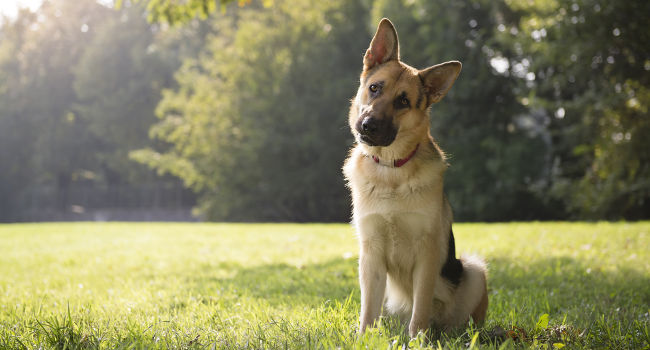Can Dogs Have Autism?

Autism is starting to be understood more and more, and research is slowly starting to branch away toward just diagnosing people with autism. Can dogs have autism? This is a question that many dog parents start to ask when their dog doesn’t act like they think a dog should.
We’re going to go in-depth to cover the answer to this question. Additionally, we’ll cover possible causes, symptoms, how you diagnose it, managing it, and more. You’ll get a good understanding of autism in general, as well as whether or not your furry friend can have it.
Defining Autism
In people, autism typically manifests and gets diagnosed based on two broad criteria. People can exhibit some or all of the listed behaviors, and there is a wide spectrum surrounding this condition. Those criteria include:
Social Interaction and Social Communication Impairments
- Appears not to hear you or fails to respond to their name
- Prefers to play alone and resists cuddling
- Lacks facial expression and fails to maintain eye contact
- Delayed speech or doesn’t speak
- Can’t keep a conversation going or start one
- Speaks with an odd rhythm or tone
- Doesn’t appear to understand directions or questions
- Appears unaware of other’s feelings
- Doesn’t point or share objects that interest them
- Approaches social interactions inappropriately
Repetitive, Restricted Patterns of Activities, Behavior, or Interests
- Performs repetitive movements like hand slapping or rocking
- Develops rituals and routines and can’t handle disruptions
- Constantly moving
- Resistant to change or unresponsive to it
- Odd movement patterns
- Fascinated by an object’s details instead of the whole object
- Food preferences or texture preferences
Can Dogs Be Autistic?
Researchers don’t have a definitive answer, and they prefer to call it canine dysfunctional behavior instead of autism. Even though the symptoms are almost identical, this is a very new field of study for researchers. It’s far to early for a definitive answer.
However, dogs are able to display behaviors that mirror autistic behaviors in people, and the first documented research of this phenomenon dates back to 1956. Recent research in 2015 by the American College of Veterinary Behaviorists reported that Bull Terriers and repetitive tail chasing may have autism links.
They performed a study that involved 132 Bull Terriers; 55 had repetitive tail-chasing behavior, and 77 were the control group with no tail chasing behavior. The researchers found:
- Tail chasing is more common in male Bull Terriers
- Trance-like behavior
- Episodic aggression (violent outbursts)
These promising findings coupled with the dog’s phobia tendencies and the repetitive motor movement of chasing their tails led researchers to believe that this could be proof of autism existing in dogs.
Possible Causes of Autism in Dogs
Lack of Mirror Neurons
One of the leading theories behind autism in dogs is a lack of mirror neurons and genetics. He defines mirror neurons as, “Mirror neurons are multimodal association neurons that increase their activity during the execution of certain actions and while hearing or seeing corresponding actions being performed by others. Neurons responding to the sound or sight of some actions, but only to the execution of different actions, are not mirror neurons.”
Genetics
A second possible cause of autism in dogs is Fragile X syndrome. In humans, this syndrome has a few prominent markers like a long face, high forehead, large ears, and a high-arched palate like you see with many Bull Terriers. More research is needed in this area before anyone can make a definitive claim.
Symptoms of Autism in Dogs
There are five major symptoms that you want to look for if you believe your dog could be exhibiting signs of autism. Keep in mind that your dog may not have all of these symptoms. However, the five big symptoms are:
1. Behavioral
- The behavioral aspects of autism in dogs are very close to what a human displays with staring off into space, running away or staying still for no reason, or avoiding objects or people. They typically don’t like new pets, toys, people, or situations because they’re irrationally afraid of things.
2. Mental
- Your dog may not be able to express their emotions correctly, and this can lead to odd or erratic behavior patterns. They may get scared for seemingly no reason, and this can cause them to avoid places or people that don’t present a threat. They may hide or retreat.
3. Physical
- Because your dog exhibits odd patterns, they may stay still or not show interest in anything that is going on around them. You may think that your dog is sick or lazy when it’s really just your dog’s behavioral pattern.
4. Sensorial
- Dogs with autistic-like behaviors feel things differently, and this causes them to react to stimuli by liking it to the incorrect emotions. This can cause them to cower or lash out when you go to gently pet them, and this can be disheartening or even scary for you as an owner because it makes them unpredictable.
5. Social
- You dog may display odd social interactions when they greet you or other animals. They may ignore you when you call them, have no interest in engaging other dogs or have little interest in daily activities like eating or going to play.
How Autism in Dogs Differs from Autism in Humans
If you look at this from a behaviorist point of view, there are very few differences between autism in dogs and autism in humans. The main differences are how the veterinary, scientific, and medical sectors treat it. The differences from these standpoints include:
- Scientists are still debating autism’s existence in dogs.
- Humans have a set list of symptoms that allow doctors to make a definitive diagnosis.
- There is no set symptoms for dogs.
- Autism is widely accepted in humans.
Diagnosing Autism in Dogs
Your veterinarian is the only one who can give you a definitive diagnosis, but they may not call it autism because there isn’t enough concrete proof yet. For your vet to give you a tentative diagnosis of autism, your dog should display some of the behaviors we listed earlier.
You want to keep track of these behaviors and give your vet a comprehensive rundown of all of them. Once you do this, they may give you a diagnosis that allows you to come up with a treatment plan.
Managing Your Dog’s Autism
There is no cure for autism, but you can do several things to help manage your dog’s symptoms so they can lead full and happy lives. Tips and tricks to help your dog cope include:
Diet
Just like autistic people need changes in their diets from time to time, your dog can also benefit from it. You do want to consult your veterinarian before you change your dog’s diet because they’ll be able to recommend safe alternatives that fit into your dog’s lifestyle and needs.
Exercise
Exercise is a great way to get your dog out and moving around because they won’t have time to think or be anxious. If you wear them out both mentally and physically, they should have lower levels of stress and anxiety overall. This leads to a happier and healthier dog.
Medications
If your dog displays aggressive or repetitive behavior, your veterinarian may prescribe tranquilizers or Fluoxetine. Fluoxetine is an antidepressant that is already commonly used for both human and animals who display repetitive or OCD-like behaviors, and it can help to calm your dog down.
Routine
Since dogs who exhibit autistic-like symptoms tend to not be able to handle change well, you may want to consider getting them into some sort of a set routine. This could be having their meals at specific times each day, playing at the same time each day, and putting them to bed or getting them up at the same time. You should also avoid rearranging your furniture.
Secure Space
Your dog is going to need a space just for them that they can retreat to in order to feel safe, secure, and calm. This can be something as simple as a crate with an open door that allows them to come and go as they please, an isolated room away from the main traffic areas of your home, or even a piece of furniture they can get behind and hide.
Bottom Line
Can dogs have autism? There is no concrete answer. If you look at it from a behavioral point of view, the answer is a definitive yes. If you look at it from a scientific standpoint, the answer is unknown. It’s up to you to decide if your dog has symptoms and talk to your veterinarian to see what they recommend for treatment.
